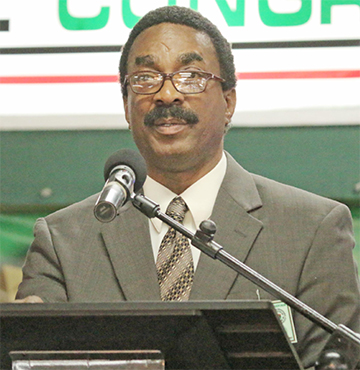President David Granger earlier today said that there is no need for Attorney General (AG) Basil Williams SC to apologise to Justice Franklyn Holder as his behaviour during a March 23 hearing of the Carvil Duncan case was not contemptuous.
The President’s position will further fuel this raging issue as the judge maintains that Williams’ conduct was despicable and that statements made constitute “contemptuous behaviour.” Williams has been adamant that he has nothing to apologise for.
Responding to questions following the swearing in of two Appellate judges at State House, Granger maintained that based on Williams’ explanation he committed no wrong.
“If the judge felt that his behaviour was in contempt, the judge knew what he had to do, he did not cite the Attorney General for contempt and as things stand I feel that the explanation given to me by the Minister of Legal Affairs adequately deals with the complaint which I received”, he said.
Asked whether he believes that an apology is in order, Granger responded “Under the circumstances I cannot see that there was anything which would have warranted his being cited for contempt of court and as I said that is the important thing. His behaviour was not contemptuous of the court so in that regard there cannot be any justifiable call for an apology because his behaviour was not in contempt of court”.

Following the courtroom exchange between the two which occurred on March 23, there were claims that the AG threated the judge. However the judge later clarified that Williams’ behaviour was disrespectful to the court and unbecoming of someone of his calibre.
Justice Holder made a report to acting Chancellor of the Judiciary Yonette Cummings-Edwards and to today there had been no official pronouncement on this aspect of the matter.
Quizzed on the issue moments after Granger had spoken, Justice Cummings-Edwards said that as far as she is aware the matter has already been dealt with. “It is a matter for the court to handle and the matter engaged the attention of the judge”, she said before later agreeing that what transpired in the courtroom that day is of concern.
Before announcing his decision to recuse himself on May 8, the Justice Holder recalled the sequence of events from the previous hearing. Justice Holder said the AG proceeded to make statements which were “insolent and disrespectful in both tone and content.”
The judge noted that Williams, in a rather “loud and bellicose manner,” said that he must record “no” based on the response of Dianna Persaud, a witness for Duncan, who was being cross-examined at the time.
According to Justice Holder, he thereafter assured Williams that a record was being made that the witness has said “no.” Not being satisfied with the court’s assurances, the judge said the AG followed up with words to the effect that previously the witness had said “yes” in answer to an earlier question and the court chose not to make a record of this.
Justice Holder said at that point he told Williams that he took umbrage to his tone and what he was insinuating, which was in effect, that the court was being selective in recording evidence.
The judge noted that Williams, in a rather truculent manner, while standing in the well of the court, responded that “the last person who told me what I should not say was a magistrate and he is now dead.”
Following that statement, the judge said, Williams then declared, “all morning Nandlall disrespecting you and you have not done anything about it.” This, the judge asserted, was not a true statement reflective of the proceedings.
Justice Holder emphasized that addressing the court by the use of the pronoun “you, ought to count in any quarter as being disrespectful.”
The judge said that this was followed by “a most egregious statement of Mr Williams, to wit, ‘I could say what I want to say and when I want to say it, I have always been like that,’” which prompted him to rise from the bench and retire to his chambers.
Justice Holder said that taken individually, the statements he recounted that were made by Williams “may be perceived as insolent behaviour and not necessarily contempt of court.”
When considered collectively and within the time frame they were made, the judge, however, asserted that the statements prima facie constitute “contemptuous behaviour.”









